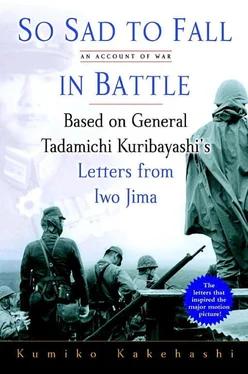The letter includes the phrase: “Please understand that I will not be sending you any more letters after this one,” so Kuribayashi may well have intended it to serve as his final message before death. But the letter—seven pages in length—was totally atypical for the final message of a military man.
It starts by describing what the island looked like and the everyday lives of the men.
As regards water, there isn’t any spring water here, so we just collect all the rainwater we can and make use of that. That’s why I keep thinking how much I’d love a nice, cold drink of water, but there’s absolutely no chance of that!
There are more mosquitoes and flies than I’d imagined. Most annoying. We have no newspapers, no wireless, and not a single shop. There’s the odd farmer’s house here and there, but they’re only suitable for cows or horses. The men are all either living in tents or in caves. The caves are airless and humid, and they really are—really, truly—awful. I’m living the same way, too, naturally.
He then goes on to talk about an air raid on the island that occurred soon after he had taken up his post.
We have already had three air raids in which we were heavily bombed, hit with a rain of incendiary shells, and strafed with machine-gun fire. On the sixteenth, a massive bomb landed next to the dugout, setting off a huge explosion. I was convinced that the dugout—with me in it—would be blown to bits, but as luck would have it, I didn’t even get a scratch. For the duration of the ferocious raid, the only thing I could do was wait in the dugout in a state of extreme anxiety, and pray.
By the time Kuribayashi arrived at his post in June, American air raids were taking a heavy toll. In three raids that month, the Japanese lost more than a hundred airplanes on the ground, while a raid on the sixteenth also killed forty soldiers. This sapped the morale of the Japanese forces and reinforced Kuribayashi’s awareness of the acute challenges he faced. The Americans actually made their landing eight months later, but even in these early days the Japanese could not relax their guard for an instant.
“If the island I’m on is captured,” wrote Kuribayashi in one of his letters, “the Japanese mainland will probably be subjected to air raids day and night.” He urged his family to get out of Tokyo fast. The letter goes on: “Just when I thought that I, as both a husband and a father, was about to make a happy life for all of you, I have been ordered to defend the most crucial territory of all for Japan in this great war. It is a duty I have to accept.”
He goes on to reveal his innermost thoughts:
Last of all, I want to say something to the children. Always do what your mother tells you. After I have gone, I want you to help your mother, treat her as the center of the family, and help each other so you can all live vigorous, positive lives. With you in particular Tarô, I pray with all my heart that you become the kind of strong, tough-minded young man that your mother and your younger sisters can depend on. Yôko, you are pretty robust, so I’m confident about you. I feel sorry for your mommy because maybe she hasn’t got that strength of character. I do regret that I had so little time to love you, Tako-chan. Please grow up to be big and strong for me.
The letter certainly sounds like a final message.
After the concluding words, “Farewell to my wife and my children from your husband and your father,” there is a three-part postscript:
1. By this post, I’m sending back anything I don’t really need out of the things I brought over with me. I think they’ll serve as keepsakes to remember me by (and it’s possible that my possessions and my remains won’t be delivered to you after I’m dead). Some military baggage may reach you, and I may send back more stuff later. Don’t send me whiskey or any other extras like that. I really don’t need them. Who knows if they’ll get through to me, and even if they do, there’s every chance I may no longer be alive by then anyway.
2. I think I more or less did everything that needed to be done around the house. I wanted to put something in to block the draft that comes up from under the kitchen floor, but sadly didn’t have the time. Tarô is, I believe, working his way through the list of things I asked him to do. Have you heard any more from Hayashi of the Imperial Guards?
3. I am not sending letters out to anyone at all just now. If any soldiers from the old days or friends ask about me, just tell them that I have gone to the front somewhere in the south.
The first postscript shows that even before he had been there a month, Kuribayashi was already sending home the personal effects he had brought with him to the front.
He must have realized once he got to the island that he would never leave the place alive. Knowing that his possessions would not make it back if he died in battle, he decided to send them back as keepsakes for his family while he still could. It’s also possible that after he took up his appointment he simply decided that anything beyond the bare minimum was superfluous. As he wrote in a letter, Iwo Jima was like a desert: “To put it in a nutshell, we’re living in caves in a barren wasteland like Iizunahara in Shinshû or Sugadaira, so, depending on how you look at it, our life is hell.”
It was the second postscript that surprised me and really got me interested.
Here was a commander in chief in charge of more than twenty thousand men and he was worrying about a draft in the kitchen in his final message.
Kuribayashi was fifty-two years old. Just prior to shipping out for the front, he had been granted the honor of an audience with the emperor, who had wished him well in his endeavor. How incredible that such a man should have chosen to list a piece of repair work in the kitchen of his home among his last, lingering regrets.
Iwo Jima was the only battle where the Americans suffered more casualties than the Japanese after America took the offensive in the Pacific War. It was an extraordinary feat for the defending side to inflict so much damage on their attackers and to force the U.S. Marine Corps to fight the harshest and bloodiest battle in its history.
On the American side, there were a total of 28,686 killed and wounded, while the equivalent figure for the Japanese was 21,152. When it comes to the number of dead, the Americans lost 6,821 men, and the Japanese 20,129. Here the Japanese figure is higher, but when the enormous gap in military strength is taken into account, the overall picture remains startling.
The Japanese army was being defeated everywhere else and it was Kuribayashi’s staunch leadership that pulled together an ill-equipped bunch of randomly cobbled-together units and enabled them to put up such a heroic fight. The enemy officers had a high regard for Kuribayashi. Lieutenant General Holland M. Smith, the marine officer who was in command of the assault on Iwo Jima, had the following to say about Kuribayashi in his book Coral and Brass: “His ground organization was far superior to any I had seen in France in World War I and observers said it excelled German ground organization in World War II.”
“My enemy he may be, but I respect him” goes the old Japanese saying. A heroic leader of men, Kuribayashi caused the Americans more pain than they were to experience anywhere else.
But this soldier who masterminded a battle that lives on in the history books was also a husband who worried about the draft in his kitchen back home. Kuribayashi’s unconventional final message makes clear that he was a man who existed in both of these worlds.
You can see how unusual Kuribayashi’s final message is by comparing it with those of other soldiers. Despite being private and personal documents addressed to their families, the letters and final messages of the majority of fighting men were terse and unemotional. They bottled up their deepest feelings and kept things brief, and if anything, it is their manly self-restraint that makes them moving.
Читать дальше












